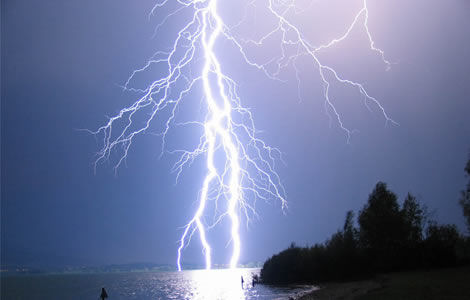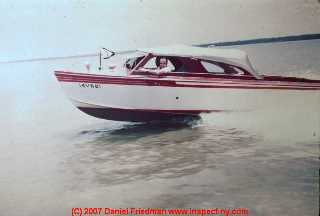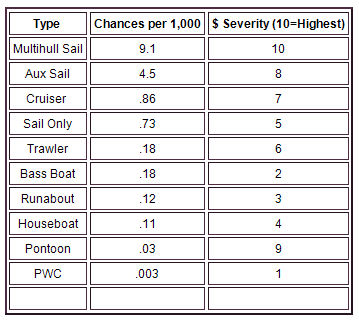Two Boaters Survive Lightning Strike
Ten people have been killed and 66 injured in the U.S. so far in 2009 by lightning strikes. World-wide over 100 people have been killed so far this year by lightning, with India, Bangladesh and Southeast Asia being the most hard-hit areas of the world. Over a dozen fishermen in boats have been killed so far this by lightning strikes in Southeast Asia alone. At least three American boaters have been struck this year, and all have survived.

Last week a father and son were fishing from their small boat on a freshwater lake when lightning struck. This happens more than you may think.
A man and his son were in a fishing boat on Sunday (June 7) when they were struck by a bolt of lightning. The two are recovering at Research Medical Center after Sunday's storm took them by surprise while they were on Harrisonville Lake, Missouri. Before ambulance crews could transport them, they had to get them off the lake, and it was a fellow fisherman who helped make that happen, they said.
Pleasant Hill Fire and Rescue, with no boat of their own, got the call at 5:30 PM Sunday that two men had been struck by lightning on the lake. "One gentleman was actually thrown from the boat," said Assistant Chief Steve Long. "Twenty years, and it's the first time I've seen it."
Help at the Dock
A pair of fishermen at the boat ramp lowered their boat into the water as the clouds hung overhead, and brought rescue workers on board.
"Two of our paramedics went out there and actually started treatment on their way in, while their boat was being towed in," said Long.
The 40-year-old father had made it back into the boat by the time they arrived. But he and his 17-year-old son were all the way around a cove, half a mile from shore.
"It was very fortunate that there was other people there with a boat that could get us out to them," said Long.
The assistant fire chief said the boat had a black spot where the lightning struck.
"At the time they were thinking it might have hit one of their fishing rods," he said.
The two men both had second-degree burns.
"Most likely it was from the flash of the heat of the lightning hitting the boat," Long said. "These guys will survive to tell their grandchildren about it. They're very lucky."
Research Medical Center staff said the father, Gabriel Neal, is in good condition.
His son, Christian, is in fair condition.
Boat Struck in Bass Tournament
Doctors at Louisiana State University Medical Center at Shreveport are saying that a man who was fishing in the McDonald’s Big Splash Bass Tournament in mid-April is lucky to be alive after being hit by lightning.
58-year-old Dale Nash and friend Tommy Young, both who live near Toledo Town were fishing on the northeast side of Lake Sam Rayburn when lightning hit the boat they were sitting in. The strike reportedly threw Nash out of the boat and ripped all of his clothes from his body. Eddie Gongre, another friend fishing nearby, jumped into the water and rescued Nash, taking him to shore where he could be transferred to an ambulance.
Young was also injured, but did not require medical treatment. Nash received first and second degree burns to an estimated 15 percent of his body and is still undergoing treatment, but is reported to be recovering. Witnesses said the lightning bolt was so strong that other anglers as far as 400 yards away experienced a shock or tingle. The friend did not require medical treatment.
Lightning in the Chesapeake Bay
Atlantic Outboard in Westbrook, CT

Lightning struck this boat in 1950.
While during research for this story we came across a post on the website of Atlantic Outboards in Westbrook, Ct. from Daniel Friedman—
Living on the Rappahannock River in Virginia, we had heard of people who were killed by lighting.
A case close to home and involving the speedboat shown here ended in tragedy in 1950 [the photograph was taken in
![]()
: a neighbor who had purchased my dad's Higgins speedboat came to take delivery.
The new owner was excited about the Higgins' reputation for speed and handling. Higgins was an early plywood-hulled inboard-motor speedboat made famous by its larger cousins such as the PT109.
Going Out In Bad Weather
The boater, who lived across the river, ignored Dad's advice that he wait with us until a rapidly-approaching storm had passed. Instead the new owner, in a rush to get his new boat home and proud of its speed, insisted on making a dash across the wide river. We watched him cast off and we also watched a wall of rain and storm rush up the river from the Chesapeake Bay.
He disappeared from view, roaring east into a wall of black storm front.
The neighbor was never found. Charred portions of the boat were found floating in a freshwater creek across the river on the following day, and it was believed he was struck by lightning while on the water.
© Copyright 2009 Daniel Friedman, All Rights Reserved.
Boat Strike Statistics
Boat US has published the latest numbers, and here they are, courtesy of Bob Adriance, for 1998-2008. Double these frequencies for Florida, he says.

Take Precautions
In his book “Seaworthy” which is published by McGraw-Hill and we recommend it to every boat owner, Adriance gives some good advice for boaters is they find themselves caught in a lightning storm—
*Stay in the cabin and do not touch metal objects, particularly things grounded to the boat such as a railing, refrigerator or metal steering wheel.
*Don’t use your VHF unless you have to.
*In an open boat stay in the center and as low as you can. Do not become a lightning rod. Take off metal jewelry.
*Stay out of the water and don’t dangle your toes in the water.
*Disconnect power leads on electronics and antenna leads – only if there is no lightning in the area.
*Lower the antennas, outriggers or anything else that you can that is protruding into the air.
*If your vessel is hit, check your bilge immediately to make sure there has been a “side flash” through your hull at the waterline, or that a through-hull fitting has not been blown out.
Some Q &A-
Why are people struck by lightning?
People get struck by lightning for a number of reasons:
The human body is is about 80 percent salty water. Salty water is a good conductor of electricity, and lightning wants to flow from the clouds to the ground through the best conductor.
A human stands upright, and being a six feet tall conductor of electricity, provides an easier path for lightning to flow than just plain flat ground.
Why do fish not get 'fried' when lightning strikes?
Fish really do get fried if they happen to be in the area of the strike, but because the ocean is vast and lightning is dispersed into the water for only a very short distance, most fish are only stunned.
Contrary to what some people believe, salt water is a GOOD conductor of electricity!
Every year around 7000-10000 lightnings strike the sea around the world.
Advice from Underwriters Laboratories on Lightning Safety during Storms
UL advises six steps to avoid being struck by lightning:
Go indoors in a large or metal frame building, preferably one which has lightning protection installed
1. Avoid high areas where you will be the highest object. As stated by LPI, UL adds, Crouch down - if you feel a tingling and your hair stands on end, lightning may be about to strike! Immediately crouch down. Do not lie down. Do not place your hands on the ground. Put your hands on your knees
2. Stay off of the lake, the tractor, etc.: lakes, beaches, open water, fishing from a boat or dock, riding golf carts, operating farm equipment, bicycles, motorcycles, even riding in a convertible can be dangerous
3. If caught outside on high ground or in the open, go to a low area and stay away from trees, particularly isolated trees. Stay away from trees at a horizontal distance of at least twice that of the height of the tree.
4. Avoid fences, poles, trees or other electrically conductive objects as they can send out "side flashes" during a lightning strike.
5. Indoors do not: stand by open windows or doors, near TVs, nor near large metal objects like sinks, tubs, radiators, stoves, refrigerators. Avoid using small electrical appliances like toasters, radios, hair dryers.